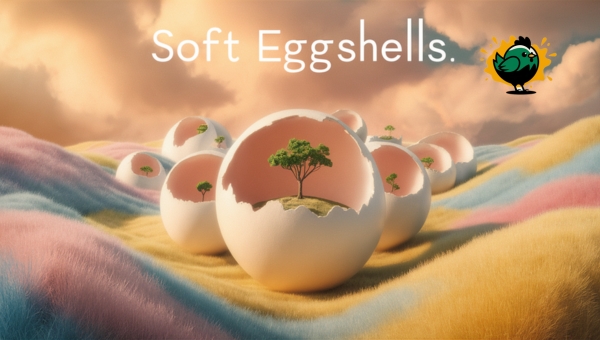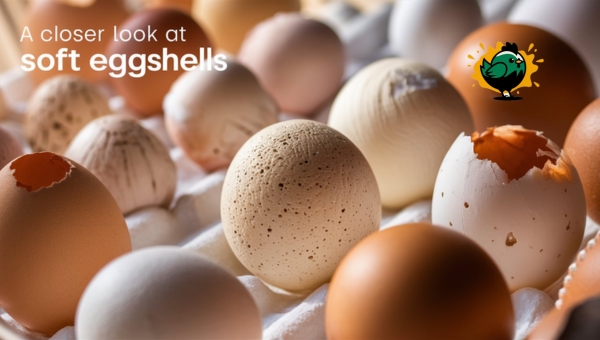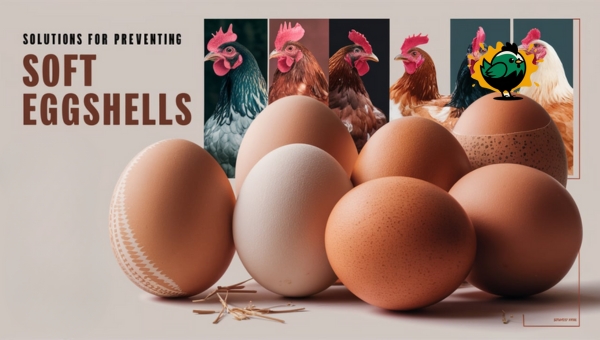Soft Eggshells: Top Reasons for Weakness of Eggshells

Imagine cracking open an egg only to find a fragile, soft eggshell crumbling in your hands. It’s a frustrating scenario many poultry owners face. Soft eggshells are not just an inconvenience; they indicate underlying issues in your flock that need addressing.
Whether you’re a seasoned farmer or new to raising chickens, understanding why this happens is crucial for maintaining healthy egg production. In this article, we’ll explore the reasons behind soft eggshells and provide practical solutions to help you ensure your chickens lay strong, healthy eggs. Let’s dive into the world of poultry care and discover how to tackle this common challenge.
A Closer Look at Soft Eggshells
Soft eggshells can be a common problem for poultry keepers, and understanding the reasons behind this issue is essential. These eggshells are typically thinner and less robust than normal eggs, which can lead to breakage and reduced egg quality.

Several factors contribute to the development of soft eggshells, ranging from nutritional imbalances to environmental conditions. Calcium deficiency is often a major cause, as it plays a crucial role in shell formation.
Additionally, factors such as high temperature or humidity can exacerbate the situation. Health problems in poultry, like infections or stress, may also impact eggshell strength. By identifying and addressing these issues, poultry keepers can improve egg quality and ensure healthier outcomes for their flocks.
Also Read: Can Chickens Eat Eggshells? You Won’t Believe the Answer
Causes of Soft Eggshells
Soft eggshells can arise from various factors affecting chickens. Understanding these causes is essential to address the issue effectively. Let’s explore the key contributors to soft eggshell formation, which include nutritional deficiencies, environmental factors, and health issues in poultry.

Nutritional Deficiencies
Nutritional deficiencies can significantly impact eggshell quality. Here are some common deficiencies that may lead to soft eggshells:
- Calcium Deficiency: Calcium is crucial for eggshell formation. A lack of calcium can result in weak shells.
- Vitamin D Deficiency: Vitamin D helps chickens absorb calcium. Without it, even if calcium is present, it won’t be effectively utilized.
- Phosphorus Imbalance: An imbalance between calcium and phosphorus can hinder proper shell development.
Environmental Factors
Certain environmental factors can also contribute to soft eggshell problems. These include:
- Temperature Extremes: Extremely hot or cold temperatures can stress chickens, affecting their ability to lay strong eggs.
- Inadequate Lighting: Proper lighting is needed for egg production. Insufficient light can disrupt laying patterns, leading to weaker eggshells.
- Stress and Overcrowding: High-stress levels and overcrowding can negatively impact poultry health and shell quality.
Health Issues in Poultry
Health issues in poultry can have a direct impact on eggshell quality. Some of these issues include:
- Infections: Bacterial or viral infections can weaken a chicken’s system, affecting egg production and shell strength.
- Parasites: Parasites can deplete essential nutrients, leading to deficiencies that result in soft shells.
- Genetic Disorders: Some chickens may have genetic predispositions that affect their ability to produce strong eggs.
Impact of Soft Eggshells
Soft eggshells can significantly affect both egg production and poultry health. When eggshells lack firmness, it can lead to various challenges for poultry farmers and enthusiasts alike.
Understanding these impacts is crucial for maintaining a healthy and productive flock. By addressing the underlying issues, one can work towards enhancing both egg quality and the overall well-being of the chickens.
On Egg Production
- Soft eggshells often result in more eggs being damaged or broken before they can be collected.
- This reduction in viable eggs can lead to decreased productivity, affecting both supply and potential income for those relying on egg sales.
- The presence of soft eggshells can also indicate underlying issues that may need immediate attention to prevent further losses.
On Poultry Health
- Chickens producing soft eggshells may experience additional stress, impacting their overall well-being.
- The effort to lay eggs with weak shells can lead to fatigue and other health complications for the hens.
- Addressing the causes of soft eggshells can help improve not only egg quality but also the health and vitality of the poultry.
Also Read: Best Hardboiled Eggs-A Guide to Perfect Results
Solutions for Preventing Soft Eggshells
Understanding how to prevent soft eggshells is crucial for maintaining a healthy flock and ensuring optimal egg production. Addressing the root causes can significantly reduce the occurrence of these issues. Let’s explore some practical solutions that can help you achieve this goal.

Dietary Adjustments
Proper nutrition plays a vital role in the formation of strong eggshells. Consider the following dietary recommendations:
- Calcium Supplementation: Ensure that the diet includes sufficient calcium, which is essential for shell formation. Oyster shells or limestone are excellent sources.
- Vitamin D: This vitamin helps in calcium absorption. Include foods rich in vitamin D or provide supplements if necessary.
- Balanced Diet: Ensure a well-balanced diet that includes all necessary nutrients, such as proteins and minerals, for overall poultry health.
Improving Living Conditions
The environment in which poultry are kept can impact eggshell quality. Here are some suggestions to improve living conditions:
- Temperature Regulation: Maintain a stable and comfortable temperature to reduce stress on the birds.
- Space and Cleanliness: Provide enough space for movement and keep their habitat clean to prevent diseases.
- Lighting: Ensure adequate lighting as it influences laying patterns and overall health.
By focusing on both dietary and environmental factors, you can effectively minimize the occurrence of soft eggshells and promote better overall poultry health.
FAQs
What causes soft eggshells in chickens?
Soft eggshells can be caused by nutritional deficiencies, particularly a lack of calcium or vitamin D. Other factors include environmental stressors like extreme temperatures and inadequate lighting, as well as health issues such as infections or genetic problems.
How do soft eggshells affect egg production?
Soft eggshells can lead to a decrease in egg production rates. This is because chickens may lay fewer eggs or the eggs may break easily, resulting in a loss of viable eggs for consumption or sale.
Can soft eggshells impact poultry health?
Yes, soft eggshells can affect poultry health. They may indicate underlying health issues or stress, leading to further complications if not addressed, such as weakened bones or increased susceptibility to diseases.
What dietary changes can prevent soft eggshells?
To prevent soft eggshells, ensure chickens have a balanced diet rich in calcium, vitamin D, and other essential nutrients. Providing supplements like oyster shells or calcium-enriched feed can also aid in strengthening eggshells.
Conclusion
Understanding the causes and impacts of soft eggshells is crucial for maintaining healthy poultry and ensuring optimal egg production. By addressing nutritional deficiencies, monitoring environmental factors, and keeping an eye on poultry health, you can mitigate the risk of soft eggshells.
Implementing dietary adjustments and improving living conditions can significantly help in preventing this issue. It’s important to note that proactive measures can lead to healthier hens and stronger eggshells overall.
If you’re eager to learn more about poultry care and egg production, be sure to explore other insightful articles on our site. Your journey to better poultry management starts here!
